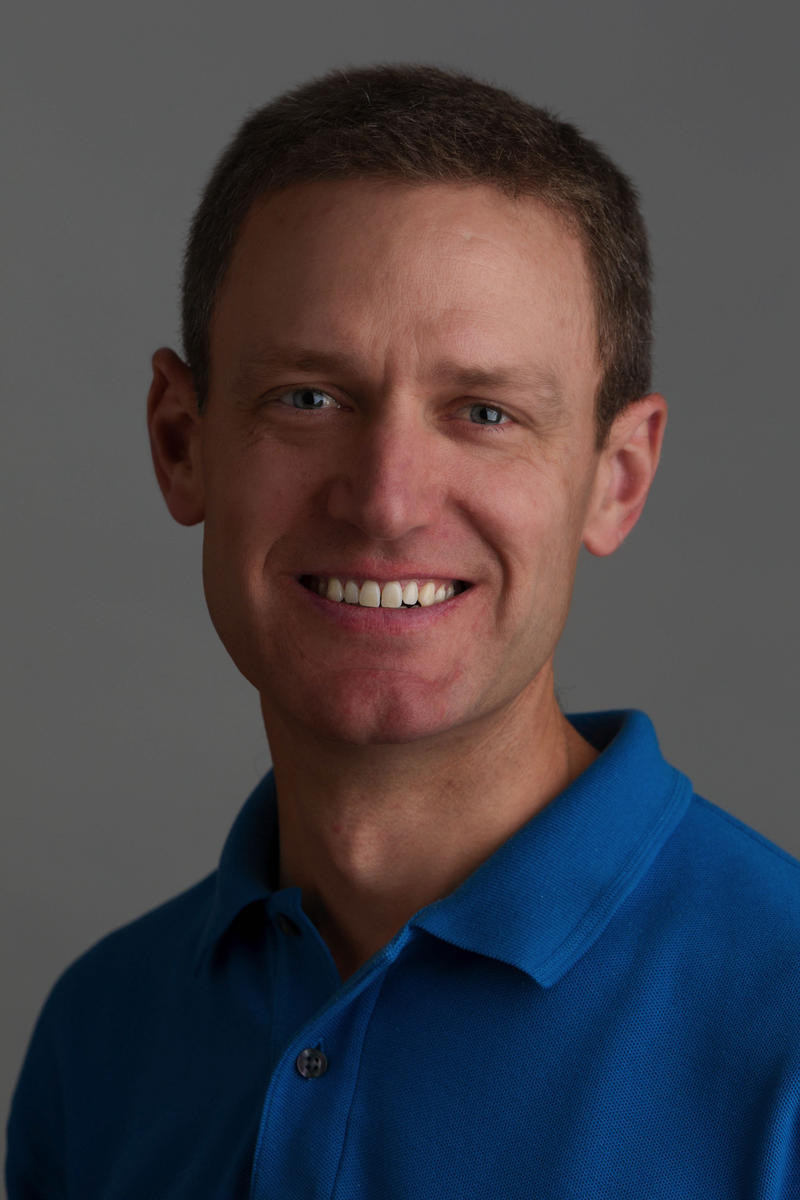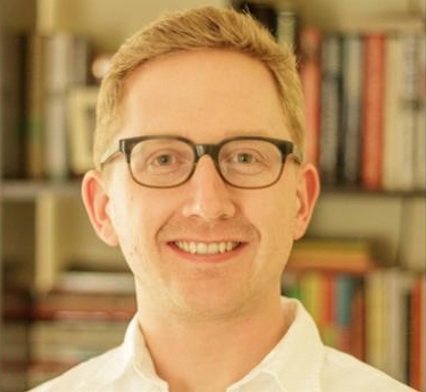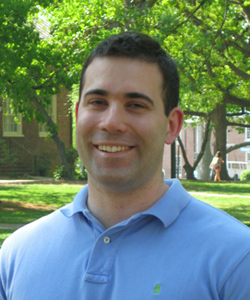Landing an academic faculty position: Alumni share tips and tactics
Being a successful job candidate requires not only skills and knowledge, but also careful preparation. For career tracks with specialized interviewing processes, such as academic faculty positions, gathering information beforehand is essential. In this article, three graduate alumni of the Department of Chemistry at Princeton share their experiences and advice on getting a research faculty position at a university.
Participants in the roundtable discussion are:
Erik Alexanian, Ph.D. ‘06 – Associate Professor at the University of North Carolina at Chapel Hill. Graduate advisor: Erik Sorensen.
Jeffrey Van Humbeck, Ph.D. ‘11 – Assistant Professor at the Massachusetts Institute of Technology. Graduate advisor: David MacMillan.
David F. Watson, Ph.D. ‘01 – Associate Professor at the University of Buffalo. Graduate advisor: Andrew Bocarsly.

1) What are some habits you developed as a graduate student that helped prepare you for the job market?
DFW: Attend seminars, whether they’re in your field or not. It’s easy to get caught up in the day-to-day challenges of research in graduate school, but it’s vitally important to become well rounded as a chemist. You’ll gain some insight into a range of contemporary research areas, which may help in formulating clever proposals and will facilitate conversations with chemists outside your field during job interviews. Also, you can compare presentation styles to hone your own job talks.
JVH: Something I have always found striking, and odd, is the fact that good communication skills are critically important to landing a position — whether in industry or academia — yet most graduate students receive no formal training. I was very fortunate to have a PhD adviser who placed an absolute premium on effective written and visual presentation, but not all students are so lucky.
If you can be self-aware and self-critical enough to realize that you need to develop more effective skills in this area, there is a wealth of resources available. All you need to be able to do is translate advice targeted at businesspeople for a scientific audience. I would very highly recommend the affordable books published by Nancy Duarte, who created the presentation for An Inconvenient Truth, as a good starting place. It’s important to remember that these materials are targeted at people looking to be the next Steve Jobs, so you have to scale back the suggestions by about 90% to make them appropriate for a scientific audience.
Nothing replaces practice, though. Find every opportunity you can to give a high-level presentation, and always try to improve.
EJA: I strongly agree with Jeff’s take on becoming an expert at giving a presentation. I think this can really have a major impact on getting hired. Having served on a few hiring committees at this point, I’ve seen candidates that had a strong package give a poor “chalk talk” that significantly lowered enthusiasm. Giving effective presentations is a universal skill that will pay a lifetime of dividends.
Another, perhaps strange, answer I would give is that I developed a healthy appreciation that everyone has limitations on their knowledge. If you go into the job search with the view that no one on these search committees is ever wrong because they are professors and we are just grad students/postdocs, it can be intimidating.
Once you realize that your understanding of your research and proposals is likely just as good (or hopefully better) than the committee’s, it evens the playing field. Professors make mistakes too! This can work wonders with self-confidence.
2) How did you approach writing original research proposals for a faculty position?
JVH: Start VERY early, and be prepared to go through numerous ideas. Over the course of two years, I prepared ten different proposal ideals to the point that they were written up in the formal manner and ready to submit. I chose the four that I was most excited about for my actual job package.
I have found that the greatest hallmark of a really exciting, and potentially successful research proposal, is that with each additional paper you read, you become more excited about your new idea, and more convinced that it will be successful.
DFW: I tried to think outside the box — to move away from my graduate and postdoctoral research areas — while still grounding the proposals in my areas of expertise and interest, such that a search committee might believe I could actually succeed! Specifically, since my grad school time in the Bocarsly group, I had been interested in the photo-physics of a particular class of materials, which at the time had not been explored greatly for excited-state charge transfer. So, I put together a few possible directions. One of my proposals panned out and became the basis of much of our research at UB for the past ten years. Another proposal went nowhere, so we ditched it.

JVH: Often times, what seems like a fantastic idea at first inception turns into a house of cards as you become more familiar with the area. It will seem as though numerous competing factors must be perfectly balanced for your idea to work, and although you might be able to find specific references to make a defensible case, it’s probably best to move on to something new. If you are working on your proposal ideas very close to the deadline, you won’t have time to think of something new, so I would very, very strongly encourage starting at least a year in advance, if not earlier.
What I think was most important to my generation of original ideas was having a few close friends, in both my PhD lab and post-doc lab, who loved talking about wild, blue-sky, scientific ideas over coffee. Almost all of my interesting ideas have fallen out of conversations with co-workers, rather than sitting alone at my desk.
EJA: I would say that many ideas came from reading broadly and identifying important limitations in your field that you are interested in. This does not happen overnight. Constantly critique your field and current research both inside and outside of your area. As far as my proposals, I had many colleagues and professors critique my ideas far ahead of time.
3) Are there any resources or opportunities that you would recommend to students preparing for the job market?
DFW: Some of my junior faculty colleagues at UB, who were hired within the past couple of years, speak highly of the ACS Academic Employment Initiative and Postdoc to Faculty Workshop. The faculty members at Princeton are an extremely helpful resource! I would encourage anyone who is thinking of an academic career to chat with many existing faculty. They will have much insight on the application process, preparation of proposals and the job itself. Don’t be shy. Most faculty will be eager to share their thoughts.
JVH: This past July I served as a (completely unqualified) mentor at the NSF Future Faculty workshop, and I think that the graduate students and postdoc attendees got some very valuable “insider” information that way.
4) Where can students find academic job postings?
DFW: My current position was advertised in C&E News, which is still probably the best source of information. The vast majority of tenure-track faculty openings are advertised in C&E News in summer through mid-Fall.
EJA: I still remember opening C&E News and reading about the position I’m in today at UNC.
DFW: At UB, we also advertise faculty positions in Chronicle of Higher Education, Higher Ed Jobs, Science, MRS Bulletin, SACNAS, and NOBCChe.
JVH: These days, you can find everything online fairly easily. C&E News, academicjobsonline.org, indeed.com. Talk to other graduate students and postdocs. I don’t think anyone really believes that they are going to get a job because nobody else “found” the application, so I was always willing to share with others when I saw a new posting.
5) How did you prepare for your academic interviews?

EJA: I actually had the wonderful opportunity of giving my proposal “chalk talk” at a different group’s weekly group meeting at Illinois. This was fantastic for me. I strongly recommend this approach. Most groups would be happy to accommodate the request because they also benefit from the experience. I got excellent feedback, and it helped because it was as close to a real job talk as you can get.
JVH: I did all of the standard things — practice presentations in front of my co-workers, contacting former group members who had successfully navigated the process, talking with faculty at my post-doc and PhD institution. To be honest, though, each interview was completely unique and unpredictable, and other than being prepared to the best of your ability to give a fantastic public presentation, and a vigorous proposal defense, I don’t know what else can be done.
Most importantly, think about how you are presenting your proposals as an entire research program, not simply as a handful of interesting ideas that will lead to a handful of interesting papers.
DFW: I gave practice talks to students and postdocs and asked a few faculty members what to expect. The first interview was eye opening. Faculty asked pointed questions and challenged assumptions and hypotheses in the proposal talk, which is entirely appropriate but took some getting used to. If I have any advice, it would be to start putting together the talks as early as possible and to discuss the interview process with existing faculty at Princeton and your postdoctoral department. They’ve been through the interview process and have served on many search committees.
JVH: And, although this should be obvious, it is worth mentioning explicitly: the entire experience is your interview. Your one-on-one interactions with faculty, and your lunches and dinners are just as much a part of the interview process as your scientific talks. Don’t turn “off” once the proposal defense is finished.
6) What is the single best piece of advice you would you give a student currently searching for a faculty position?
EJA: Remember that the entire faculty have input on the hiring process. This means that you want to make all of your interactions as positive as possible during your visit. Faculty outside of your “division” will also have input on your proposals/talk as well — much more than I would have guessed. So you need to make sure that your presentations can be understood by a broader audience at some level.
With respect to your application package, having your future research directions/proposals summarized on one page is an excellent way to do this in my opinion. Leave the details for the full proposal, where committee members in your division can find more information. That one sheet is priceless for those outside of your specific area of interest.
DFW: Two thoughts: 1) Develop proposals that differ substantially from prior graduate and postdoctoral research. Any good postdoc can propose a logical extension of an existing project, but that won’t inspire a search committee. Instead, get creative! Once you land a job, the key to getting funding and tenure is to establish an independent line of research. 2) Try to find the perfect fit. Chemistry departments vary greatly in size and the relative emphases on graduate vs. undergraduate education and teaching vs. research. Landing a job in the right environment is a key step towards success and satisfaction.
JVH: Take care of yourself during the interview period!
What I was shocked by was how draining the entire process was. I was living in California at the time, and most of my interviews were in the East. I thought that I was still young enough, and vigorous enough, to be taking red-eye flights, or to be doing one interview on Monday, and another on Wednesday, on a single trip. Those were both big mistakes.
By a wide margin, my best interviews came when I paid for an extra night of hotel out of pocket, and arrived a day early. If you can afford to do it, it was worth every penny, and I couldn’t believe the difference it made to my energy level throughout some very intense days.
Nobody knows your PhD and post-doc work better than you, and if you are passionate about your original ideas, there should be a strange pleasure from defending them against all attacks. Although there certainly were some interviews where I immediately knew I wouldn’t be getting an offer, I didn’t leave any interview thinking that I needed to improve either my public talk or proposal defense. Often times, you simply aren’t the right fit, or have a different belief about what an exciting new direction in chemistry is.
Best of luck to everyone!
